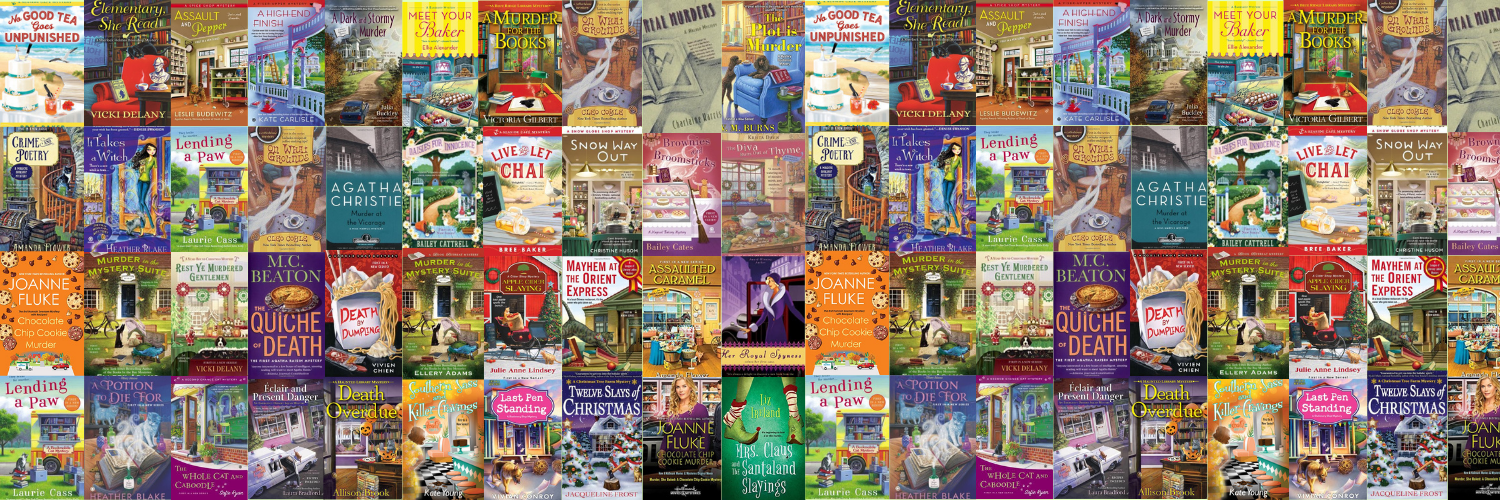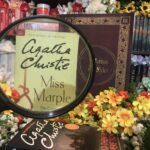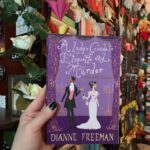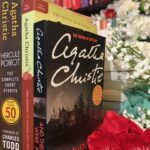by J. Ivanel Johnson
Clew
A ‘clew’ in Chaucer’s day was a ball of yarn. Prior to that (very much PRIOR, in Greek mythology!) Ariadne ( **fun fact – first name used by Agatha Christie for her detective Ariadne Oliver, the one she herself said was most like her) gave her beloved Theseus a ball of yarn to unravel as he made his way into the maze to slay the Minotaur. He then used the unravelled yarn to find his way back out again, so when Chaucer wrote about this, he called it a ‘clew’ of yarn. And since it was something used to find one’s way out of a puzzle, problem or difficulty, clew became the general term for ‘used to find a solution’. As spelling does, clew then evolved into ‘clue’. (**fun fact – I did just read a Christie in an old anthology, and they still were spelling the word ‘clew’, which led me to this entire blog theme! )
Christmassy Fun: Google the words ‘Cluedo at Christmas’ and see the many games you can purchase with Christmas-themed cozy mystery themes!
Red Herring
The term ‘red-herring’ (meaning ‘false clues’ which writers drop to lead the reader merrily down separate trails for a possible solution to the mystery which will end up being wrong) is NOT, as some believe, from early animal rights activists laying a false scent for hounds to distract them from the fox or stag. William Corbett, in 1807, was a British reporter who talked about his father telling him a fable about a smoked herring being used to distract a dog from a hare. He then used this as a metaphor for how the public and sometimes the police tried to get journalists ‘off the scent’ of the correct facts of a story, by throwing out ‘red herrings’. (**fun fact – there is actually a BOOK called “Christmas at the Red Herring” by Bing Smith. It’s about a bar in Boston being robbed by ‘a gang of gun-toting Santa Clauses).
Shadowing It should be obvious that ‘shadowing’ means following a suspect, just as our shadows appear to follow along behind us. But on this term, I’d like to point out that one of my favourite poems, Tennyson’s Lady of Shalott, was the first to complain about shadows. “I am half-sick of shadows”, she says – meaning her whole imprisoned life (due to a curse) means she can only weave by reflections and dark shadows from her mirror. That famous phrase in the poem has led to the titles/themes of plays, paintings, and Book 4 in one of my favourite more recently-written cozy mysteries series – the Flavia de Luce series by Alan Bradley. “It’s Christmastime, and the precocious Flavia de Luce—an eleven-year-old sleuth with a passion for chemistry and a penchant for crime-solving—is tucked away in her laboratory, whipping up a concoction to ensnare Saint Nick. But she is soon distracted when a film crew arrives at Buckshaw, the de Luces’ decaying English estate . . . “ READ THIS SERIES! It’s terrific
Alibi
The earliest known use of the word alibi is in the early 1600s. OED’s earliest evidence for alibi is from 1612, in the writing of Edward Grimeston, a translator. But it would have been used as an adverb, meaning ‘elsewhere’ which is what it means in Latin. When the word was first adopted into English in the 17th century, it was still limited to its adverbial use. A person on trial might be said to prove himself alibi when the crime was committed. By the end of that century, however, alibi had acquired the status of a noun and was used in legal contexts for “the plea of having been elsewhere at the time of the crime.”
A cozy mystery by Linda Shoaf that just came out this year (ratings aren’t great, but give it a try, you avid cozy lovers!) is entitled “All I Want For Christmas Is An Alibi”. And, while not cozies, Sue Grafton’s Kinsey Millhone series are phenomenal detective mysteries, funny, sometimes gritty and suspenseful, sometimes almost traditional whodunnits . And her first in the alphabet series, as they are known,is “A if for Alibi”. If you have never given her works a chance do so now – you will NOT be sorry!
Terms for Private Investigators: Gumshoe, Shamus, Sleuth: Gumshoe originated in the early turn of the 20th century, but stems to the late 1800s when the soles of shoes were made with gum rubber, which made it easier to walk around quietly. It was originally, before 1906, referring to a thief. Middle English speakers first borrowed sleuth from Old Norse, the term referred to “the track of an animal or person.” In Scotland, sleuthhound referred to a bloodhound used to hunt game or track down fugitives from justice. The origin of Shamus is unclear, but could be Yiddish (meaning synagogue sexton)Hebrew (meaning servant to all) or Celtic because so many early American detectives were of Irish descent (thus, possibly from the common Irish name Seamus, the American equiv. of ‘James’.) And while many Irish private eyes began their own detectives’ clubs, have you heard of Michael Chabon’s The Yiddish Policeman’s Union ? There’s some spec-fic. fun going on up there in Alaska, and I’ve two manuscripts I’m working on now set in Yukon – where I once stayed in the cold dark leading up to Christmas in 1983. Brrrr…
Also, for our Jewish friends, have a look at the Rabbi Small mysteries, or these Mystery Anthologies Celebrating Hanukkah
The Melancholy Menorah (Jewish Regency Mystery Stories Book 4), Libi Astaire
The Latke in the Library and Other Mystery Stories for Chanukah, Libi Astaire
36 Candles: Chassidic Tales for Chanukah, Libi Astaire
Murder is No Mitzvah: Short Mysteries About Jewish Occasions, Abigail Browning
Whodunnit
There are many theories about the origin of this popular term (google for yourself!) but of interesting note: It was already so OVERused by 1939 that a reviewer/journalist declared it “too heavily overworked” and predicted it would soon be dropped forevermore. History has proven that prophecy false, and whodunnit or ‘whodunit’ is still going strong.
Professor Plum and the Christmas Plums …Ever wondered why the game “Cluedo” is so-called? (And the Americans call it just “Clue”). It was amalgamated from two words ‘clue’ and ‘ludo’, which is the British name for Parcheesi. (**fun fact: When I was young, I assumed Professor Plum must have had some relation to Christmas. The only time I played Cluedo was at family friends’ during the holidays, and because of the shape of the original Cluedo ‘men’, the bell-shape and purple colour (see image)
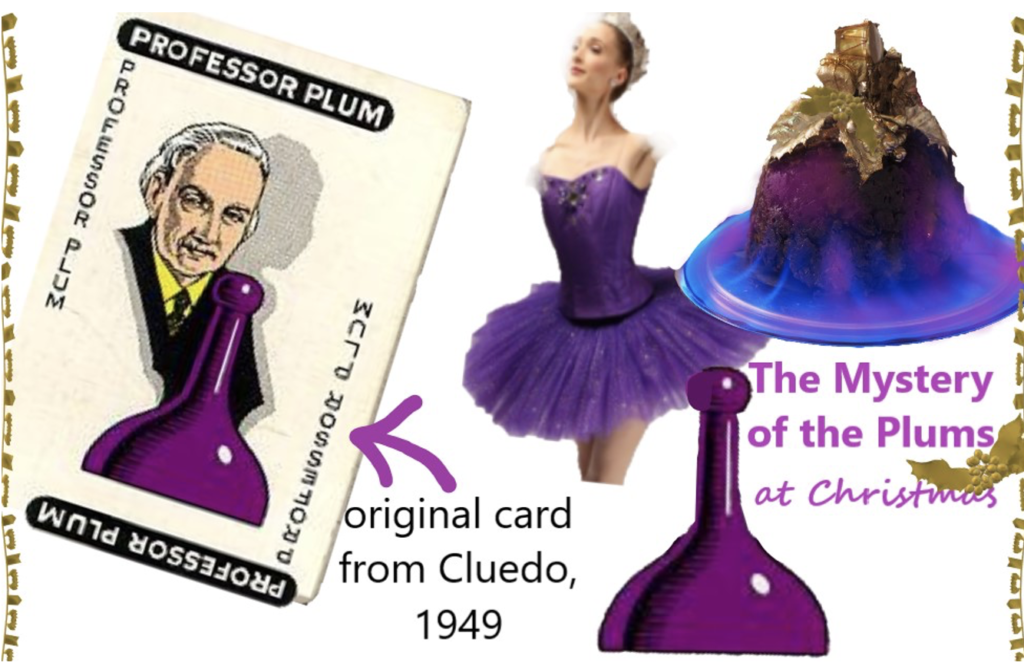
also brought to mind the first Sugar Plum Fairy I saw in The Nutcracker AND was the shape and colour (with the flames) of my Anglophile grandmother’s plum pudding, served every Christmas night. Along with her homemade Christmas crackers made out of toilet paper rolls. This is the same grandmother who began drafting the plot and some characters of my Just A STILL LIFE incidentally – 75 years ago.)
Christmassy fun: One of my favourites of Agatha Christie’s short stories is The Adventure of the Christmas Pudding. It is, of course, set in a large country house and there is, of course, a Colonel – who nearly chokes on a ruby found in the pudding (instead of the usual silver sixpence). And on his pillow, Poirot, who is a guest there, finds a scrawled note which reads, “DON’T EAT NONE OF THE PLUM PUDDING. ONE WHO WISHES YOU WELL.” Here’s a short and puzzling treat to read aloud to the family by the fire Christmas Eve!
And a final Plummy recommendation. If you haven’t yet found your way to Janet Evanovich’s Stephanie Plum series, WHAT ARE YOU WAITING FOR? The books are great, the audio books even better (you get to hear all the diverse voices!) (NOTE: Ignore the one movie – dreadful, and everyone says so!) You’ll laugh along with all the antics and characters and still have a whopping good time trying to solve a bit of mystery and enjoying a bit of suspense too. There’s even a Christmas one: Visions of Sugar Plums. The tag line is “spicier than gingerbread, with more nuts than a fruitcake.”
Top Christmas Wordplay/Puns used by Cozy Mystery Authors/Playwrights and Whodunnit Murder-Mystery Game Developers:
Sleigh/Slay, Fowl/Foul, Knife/Night, Dashing/Slashing (or Crashing), Rehearse/Hearse, Stocking/Stalking, Candy-Caned, Decked, Punched, Claus/Cause, Iced/Sliced, Yule/You’ll (as in ‘be sorry’, ‘be dead’, etc). Hearth/Heart, Nave/Grave, Snow/It’s No, Holly or Jolly/Folly and for Jewish readers: Unleavened Dead, Sin-a-nog, Yom Kippur/Killer, and you get the idea… !
J. Ivanel Johnson

J. Ivanel Johnson is the pen name for an award-winning author/poet, playwright and composer living with (dis)Ability, who now resides in the Appalachian range of Northwestern New Brunswick, where she and her husband and mother manage near-to- self-sufficiently on their small farm overlooking inspirational views of nature. Like her grandmother before her (the ‘Ivanel’ of her pen name) she has written her entire life, first publishing two poems with Annick Press in Toronto when she was only 11. She has been a high school English and Drama teacher, working and living in the highlands of Scotland, the moors of Yorkshire, and the Rockies of Montana and the Yukon, before settling in the east of Canada. She has also been a Junior Olympic/Young Riders equestrian coach in 3 countries, and a therapeutic riding instructor, with some of those experiences related in the short creative memoir published as “Iron Bone” in 2019’s Nothing Without Us by Renaissance Press, Ottawa.
